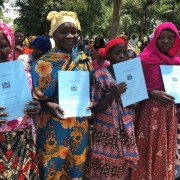Speeches Shim

In Tanzania, conflicts between pastoralists and crop farmers frequently occur, although most go unreported. Land-related conflicts often lead to unsustainable exploitation of natural resources, destruction of farms, crops, and houses, theft of livestock, and even loss of life. One of the worst conflicts between pastoralists and farmers occurred in December 2000 in Morogoro Region when 38 people were killed. Women and children often suffer most when conflicts occur. Tanzania’s ability to attain sustainable development goals like poverty reduction, gender equality, and climate action are compromised when conflicts develop over land resources. Furthermore, in communities with land conflicts, households dependent on subsistence agriculture are pushed towards more unsustainable activities such as charcoal production and short-cycle crop practices which can degrade soil and water resources. Worsening stresses brought on by floods, droughts, and population growth further reduces the resilience of communities and households.

The United States has announced an additional $2.4 million (5.6 billion Tanzanian shillings), through the United States Agency for International Development (USAID) in health assistance funds for the strengthening of laboratory capacity for optimal diagnostics, risk-communications, water and sanitation, the prevention and control of infections, public health messaging, and more. This support complements the $1 million recently announced COVID-19 relief funds, for a total of $3.4 million in new resources for Tanzania. In addition, the U.S. government has directed existing $1.9 million to address COVID-19 for a total of $5.3 million (12.2 billion Tanzanian shillings).
The Usimamizi Endelevu wa Maliasili (“Resilient Natural Resources Governance”) activity works to conserve land, wildlife, forests, and water resources in the Lyamba lya Mfipa ecosystem. The activity also strengthens resilience of local communities in the Rukwa region through improved natural resources governance.

Moshi Chacha (47) is a widow living in Kubitere Village, Tarime District, Mara Region. Her late husband left Moshi with six children to look after and without a reliable source of income. A turning point in Moshi’s life came in 2018, when she joined a USAID Waache Wasome (“Let them Learn”) Livelihood Improvement for Mothers and Caregivers of Adolescents (LIMCA) group. LIMCA is a community-based savings and lending platform that supports socio-economic change at the household level. The group’s interventions help put families in a better position to meet their daily needs and support the continued education of their daughters and sons.
The United States Agency for International Development in Tanzania is seeking offers/applications from qualified Tanzanians to provide personal services under contracta. The incumbent will be a Malaria Project Management Specialist for the management and coordination of selected malaria activities under the U.S. President’s Malaria Initiative (PMI) within the Health Office (HO).


Comment
Make a general inquiry or suggest an improvement.